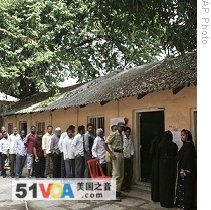New Delhi
23 April 2009
Millions of Indians have voted in the second phase of the country's month-long, staggered election to choose a new parliament. Scattered incidents of violence by suspected Maoist rebels marred the vote in some parts of the country.
 |
| People wait outside polling station to cast votes in Bangalore, 23 Apr 2009 |
Thursday's vote marks the second stage of the country's five-phase election for 543 parliament seats. The polling was mostly concentrated in eastern and central India.
Prime minister among voters
Among prominent voters was Prime Minister Manmohan Singh. He cast his vote amid tight security in Gawahati city, in the northeastern state, Assam. He expressed confidence that his Congress Party will return to power.
"There will be a Congress-led government at the center," he said.
Polling was largely peaceful in much of the country. But suspected Maoist guerrillas carried out sporadic attacks in eastern India, where the rebels have bases in remote, jungle areas.
Some violence reported
Police say the Maoists hurled a bomb at a jeep carrying polling officials, injuring at least two people, and burned several vehicles outside a polling station in Jharkhand. Police also engaged rebels in an hour-long gun battle when they attempted to disrupt polling. The Maoists briefly hijacked a train on Wednesday, but released the passengers, unharmed.
The scale of the Thursday violence was less than in the first phase of polling, held last week, when suspected Maoists killed at least 18 people.
Ruling party vs Congress-led coalition
The main contenders in India's elections are the ruling Congress-led coalition and the opposition alliance led by the Bharatiya Janata Party.
Neither of the two is expected to win a majority and regional parties are expected to play a prominent role in deciding who will form the next government.
In the Thursday fray were several powerful regional groups who have vowed not to ally with either of the two main parties, but support a bid by regional parties to come together and form a government.
Naveen Patnaik heads the Biju Janata Dal in eastern Orissa state.
"I am not going to be at all flexible. Certainly my party and I are not going to be flexible about ever considering support to a Congress-led government or a BJP-led government," said Patnaik.
There will be three more rounds of voting over the coming weeks, with the last scheduled for May 13. Votes will be counted on May 16.